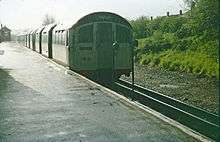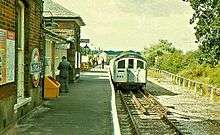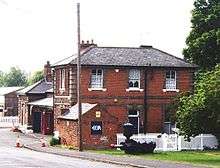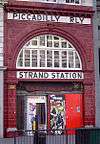Ongar railway station
| Ongar | |
|---|---|
|
Ongar station after re-opening in 2012 | |
| Location | |
| Place | Chipping Ongar |
| Area | Epping Forest |
| Coordinates | 51°42′32″N 0°14′34″E / 51.7089°N 0.2428°ECoordinates: 51°42′32″N 0°14′34″E / 51.7089°N 0.2428°E |
| Grid reference | TL550034 |
| Operations | |
| Original company | Great Eastern Railway |
| Pre-grouping | Great Eastern Railway |
| Post-grouping | London and North Eastern Railway |
| Operated by | Epping Ongar Railway |
| Platforms | 1 |
| History | |
| 24 April 1865 | Station opened |
| 25 September 1949 | Transferred to LT Central line |
| 18 November 1957 | Electrified |
| 18 April 1966 | Goods yard closed[1] |
| 30 September 1994 | Station closed |
| November 2004 | Reopened in preservation by Epping Ongar Railway Volunteer Rail Society |
| December 2007 | Station closed |
| 25 May 2012 | Reopened by Epping Ongar Railway |
| Stations on heritage railways in the United Kingdom | |
| A B C D E F G H I J K L M N O P Q R S T U V W X Y Z | |
|
| |
Ongar railway station is a station on the Epping Ongar Railway heritage line, and a former London Underground station in the town of Chipping Ongar, Essex. It was opened in 1865 by the Great Eastern Railway, and became part of London Transport in 1949. Until its closure as such in 1994, it was the easternmost point of the Central line.
History




The station was opened by the Great Eastern Railway on 24 April 1865,[2] serving principally as a goods station taking agricultural produce from the nearby farms into central London. On 29 September 1949, London Underground services took over the operation of the station from British Railways when services were extended from Loughton.[2]
Although the rest of the branch was electrified by London Underground before operations were taken over from British Railways, trains on the section north of Epping continued to be hauled by steam locomotives as a separate shuttle service. The service was operated by British Railways for the Underground until 18 November 1957, when the line was electrified and electric trains took over from steam.[3] A shortage of power prevented the Epping to Ongar section being fully integrated into the line and it continued to operate as a shuttle service.[4]
The entire Epping to Ongar branch was a single track line with one passing place at North Weald station, although this loop was taken out of service between 1888 and 1949, and again from 1976. Between 1949 and 1976 two Tube trains could use the branch, although they were limited to four cars in length because of the restriction on the available traction current, as well as by the restricted platform lengths at North Weald and Blake Hall. The service was reduced to one train after the southbound track at North Weald was lifted. It was therefore never suitable for heavy use, and the line was reportedly never profitable. For much of its latter years, the service only operated during Monday to Friday peak hours, and London Transport closed Blake Hall station, the least used on the entire system, in 1981. The line itself continued in use and there was a brief re-introduction of all day services in 1990. However, a system wide cost-cutting exercise saw the service return to peak hours soon afterwards, with an even more skeletal service than before. The line was under threat of closure for many years, and it was finally closed on 30 September 1994.
Epping Ongar Railway
The station and the line are now in the ownership of a private company, Epping Ongar Railway Ltd who, at time of purchase, publicly stated their intention to run commuter services again, but the claimed lack of platform availability at London Underground's Epping station at the west end of the line has to date proven an insuperable obstacle to this. The Epping Ongar Railway Volunteer Rail Society ran heritage trains on Sundays over the former Epping and Ongar line from 2004 until 2007, when the line was closed following a change in ownership.[5]
The line was reopened to the public on 25 May 2012.[6]
Ongar Station, as with the rest of the 6.05-mile branch reaching to the outskirts of Epping station, is currently undergoing significant improvement and infrastructure works. These are designed with the long-term future of the branch and to enable the use of locomotive-hauled trains (hauled by steam and diesel locomotives), all in keeping with its use as a heritage railway. The station itself has been extensively restored by the teams of volunteers, with all the rooms being restored to their original layouts, opening up bricked up doorways and windows, and restoring the station to Great Eastern Railway colours (believed to be the only original operational GER station in its original colours). Within the station the former Parcels Office will be a museum and educational display.
In addition a GER signalbox, originally located at Spellbrook, has been rescued and rebuilt to replace the Ongar signalbox demolished by LU in the 1980s, and the platform is being improved to facilitate access.
Connections
Local bus routes 7, 7A, 7B, 7C, 20, 21, 32, 46, 46A, 47, 146, 380, 381, 501 (Sundays only), 846, SB05 and Epping Ongar Railway Vintage Route 339 serve the station (and town).
Controversy
In 2015 a pornographic film was filmed at Ongar railway station.[7]
Other information
The sand drag at the very end of the rails — intended to help slow trains that overshot the stopping mark — was said to be home to a breed of harmless scorpion and featured in a 1979 episode of the BBC's Wildlife on One. They had been released there by a station foreman who was a keeper of exotic pets.[8][9] The sand drag has since been removed. A scorpion has since been sighted in the wild, ten miles north of Ongar, in April 2010, although this is thought to be unrelated.[10]
In 1971/72 the London underground network was remeasured in kilometres using Ongar as its zero point.[11][12][13]
The Royal Navy's Tigerfish torpedo was known as Project ONGAR during development.[14] It was named after the station as the engineers hoped their new weapon would be "... the end of the line for torpedo development".
Ongar Tube was mentioned in the Ade Edmondson book How To Be A Complete Bastard. You could be a "Complete Bastard" by telling tourists that all of London's tourist attractions were within walking distance of Ongar Tube.
See also
References
- Notes
- ↑ Hardy 2011, pp. 175-183.
- 1 2 Feather, Clive (31 March 2011). "Central line, Dates". Clive's Underground Line Guides. Retrieved 18 March 2008.
- ↑ Lee 1970, p. 31.
- ↑ Feather, Clive (31 March 2011). "Central Line, History". Clive's Underground Line Guides. Retrieved 18 March 2008.
- ↑ Skinner, Paul (2011). "Epping Ongar Railway - Line history". Retrieved 5 July 2010.
- ↑ Thomas, Cliff (July 2012). Pigott, Nick, ed. "Essex railway becomes Britain's newest steam line". The Railway Magazine. Horncastle: Mortons Media Group. 158 (1335): 9. ISSN 0033-8923.
- ↑ "Porn movie filmed at Epping Ongar heritage railway". BBC. 1 April 2015. Retrieved 24 September 2015.
- ↑ Lyons, James (20 January 2007). "Epping Ongar Railway History - Ongar station". Archived from the original on 8 Jul 2011.
- ↑ Bowen, David (9 July 1995). "There's life in the old track yet". The Independent. Retrieved 28 September 2014.
- ↑ Snow, Keith (August 2010). "Scorpion found in the Ongar area" (PDF). Ongar Wildlife Society (16). Retrieved 16 February 2015.
- ↑ Feather, Clive (2 April 2011). "Introduction - Kilometrage". Clive's Underground Line Guides. Retrieved 22 May 2011.
- ↑ Glover, John (2003). London Underground, 10th edition. Ian Allan. p. 109. ISBN 0 7110 2935 0.
- ↑ Glover, John (2011). London Underground, 11th edition. Ian Allan. p. 100. ISBN 978 0 7110 3429 7.
- ↑ Public Record Office ADM 290/289
- Bibliography
External links
| Wikimedia Commons has media related to Ongar railway station. |
- Feather, Clive. "Central Line". Clive's Underground Line Guides. Retrieved 18 March 2008.
- Lyons, James (20 January 2007). "Epping Ongar Railway History". Epping Ongar Railway History. Retrieved 22 May 2011.
- Skinner, Paul (2011). "Epping Ongar Railway". Retrieved 5 July 2010. Epping Ongar Railway's Official Website
- London Transport Museum Photographic Archive
- London's Abandoned Tube Stations - Ongar station
- London's Abandoned Tube Stations - Epping to Ongar branch
| Preceding station | Following station | |||
|---|---|---|---|---|
| North Weald | Epping Ongar Railway | Terminus | ||
| Disused railways | ||||
| Preceding station | Following station | |||
towards Epping | Central line Epping-Ongar branch | Terminus | ||
